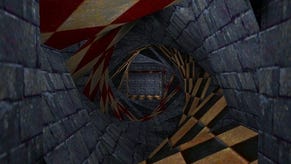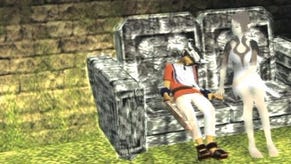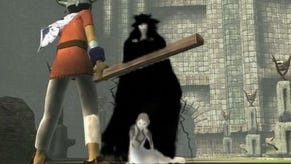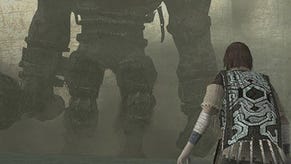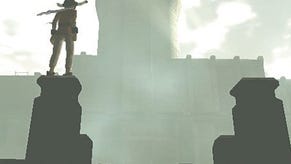ICO
Out of the Shadow.
Tom's not ready to break up
Here's a truism about games: very little is ever as good as you remember. I really believe that. In fact, I believe it so much, I'm going to make you sit there while I brutally shatter several of my own dreams just to prove a point. Let's see. I regularly describe Super Mario Kart as one of my all-time favourite games. I will now play it.
Oh god. Oh GOD. GOD. I was just being bolshy! I thought this was going to be another abandoned intro cast into the depths of the .doc, destined to sit there until I rubber-stamp its backspaced doom! I'M ACTUALLY RIGHT! SUPER MARIO KART IS AWFUL! This is what I remember: fluent, brilliantly fast and controllable racing. This is what I just experienced: stop-start, horribly unforgiving drift-drenched nostalgicide.
Right, okay, I'm going to pick something a bit more recent, like, er, Jak & Daxter.
This is a joke right? Someone's hiding in my PS2 frame buffer with some crayons? Please be? Awful, awful movement, awful graphics, stupid objectives.
This is horrible and I can't go on. I want to scrap this and undo the last 20 minutes. This isn't even horrible like when I bought Star Wars DVDs and discovered George Lucas had changed things; he could've made Jar-Jar Binks the emperor and had Greedo get up, walk around the table and cock-slap Han Solo in the face before he shot back and I'd still prefer that version of life to the one I'm in now where all I can think of is how my ENTIRE CHILDHOOD WAS A LIE.
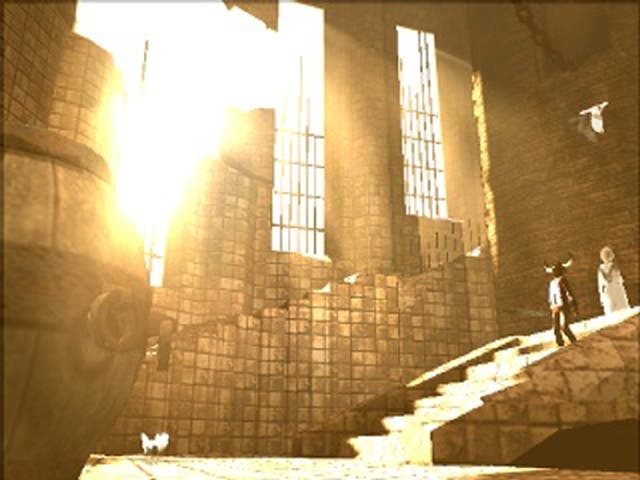
Still, it does at least help me with one thing: ICO is unlike the vast majority of games in this sense too; I played through it again this week and it's still every bit as brilliant.
The temptation I get when trying to kneejerk some explanation of why ICO is so compelling is to fixate on its simplicity. All you do is run around a castle trying to open doors so that you and your new friend Yorda can escape to the next section. That's really it. She is capable of opening doors that you cannot, but she is too weak and the language barrier between you too great for her to know to clamber over things and undertake all the strenuous chain-swinging, box-shifting, ledge-climbing and so on that you'll be doing. Even though you can get where she needs to be easily, getting her there is more important.
Let's say you have a pair of switches, a door that opens when they're both depressed, and one wooden box. You coax the girl to stand on the second switch so that you can walk through the door, before navigating your way up a system of interconnecting broken shelves and climbing through a window onto a ledge, where you discover you can push a second wooden box down to the ground below and position it to take her place. As a result you can both walk through and attack the next obstacle. Solving simple, logical problems is the bedrock of many a great pastime - much of what you do in ICO is analogous to solving a Sudoku problem, for example. The satisfaction of watching everything dovetail together is worth striving for. And it feels so fluid to play - one of the only platform games other than Prince of Persia to react so perfectly to your input, catching ledges and ladders from awkward angles, and letting you do what you need to do as elegantly as possible.
But it's not just a question of simplicity, and ICO is hardly a match for the Times crossword. Some of the game's problems are taxing, but while it deserves credit for walking the line between straightforwardness and frustration more or less expertly, in truth it's the way that it never muddles you up that belies its true strength: ICO is special because it's in no rush to impress you. The premise is introduced with one of the game's only narrative cinematics, which sees you deposited in a stone casket in a vast castle, from which fortune has it that you'll escape and discover an elflike girl suspended in a cage high above a vast hall. You are in a castle, you have met a girl, and you have decided to free her - there's virtually no complicated exposition, seldom any dialogue. Likewise, when you flick the analogue stick the opposite direction to the one you're facing, you instantly turn on the spot, with one frame of animation. It's not rough-hewn; it's the way it needs to be.
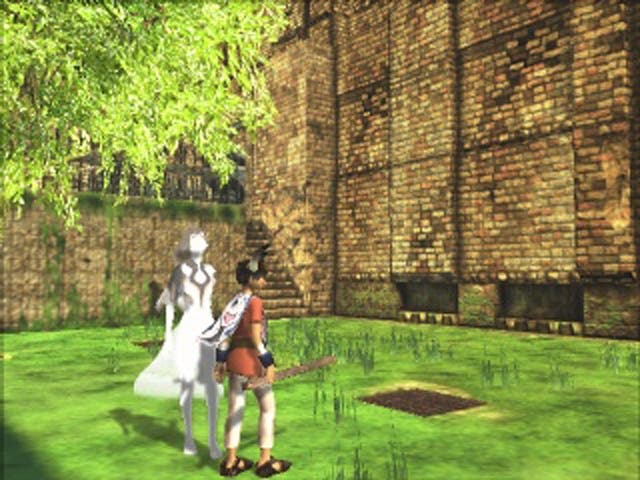
Each situation you face demands that you keep a watchful eye on this fragile girl you've become bound to, Yorda, because the forces of the castle do not wish her to escape. Like much of what occurs, their presence, and their origin, is never fully explained; you're given enough to decide a version of events, but ultimately you're left wondering. When they attack, through black holes in the ground to the sound of, well, it's hard to think of the sound as anything other than the darkness reaching for you; when they attack, you must repel them before they can pull Yorda into whatever world it is they occupy. So the balance is struck - you must explore the castle, uncovering safe passage for Yorda, but never letting her too far out of your sight.
In this way you quietly, logically, willingly proceed, and the illusion is perfect: the game never tells you what to do, even though the game is always telling you what to do. And as the music quietly blows through the castle and you and Yorda make your way around, occasionally flopping silently into the incongruous, but somehow acceptable stone couch that allows you to save your progress, your mind free from the usual burdens of health bars, inventory management, dead ends, quests and overly elaborate narrative, you can focus on what's left: the beautiful castle, and the beautiful way you explore it.
Easily the most amazing thing about ICO in 2006 is that it hasn't aged, graphically, and the key to that is not in its resolution, technology or imagination - though its landscapes and architecture are vast and picturesque, and the distribution of light and darkness perfectly judged - but in the way that the characters of Ico and Yorda exist almost entirely within the movements of their in-game models. Ico speaks sometimes, but never says what he's feeling. Yet he is strong, determined, caring, bold and full of belief that he must do what is right no matter how unlikely his chances of success. Nothing Yorda says is explained in English until you have completed the game. And yet she is nimble, childlike, dainty, lost, afraid, at times impish and at others cautious, and often confused. I've seen grown men overwhelmed by the enormity of her incarceration - its unfairness articulated by little other than way her feet patter on the ground as she runs and her hand flaps behind her as Ico pulls her along. It's not FAIR. Me - I actually had to turn the pad vibration off because, when I ran and held her hand tightly, jerking her along stride by stride, I felt like I was hurting her.
Holding hands is the game's second most amazing trick. By holding R1 you call Yorda to follow and join you, but by holding it when you're in close contact, you grab her hand and yank her around. (Perhaps the best example of its subtly brilliant graphics, incidentally, is that this is never a comical sight.) When you call her from across a small gap or atop a small ledge, you can haul her up or catch her as she leaps. The speed of Yorda's reactions increases perceptibly as she comes to trust you more. Perhaps the best summary of its effect is the way that, as you catch her and she dangles from your grasp above a vast drop, and you're holding R1, you have to remember to pull her up using the analogue stick. There's no need for it to be a two-function response; it just gives you a second to catch your breath together.
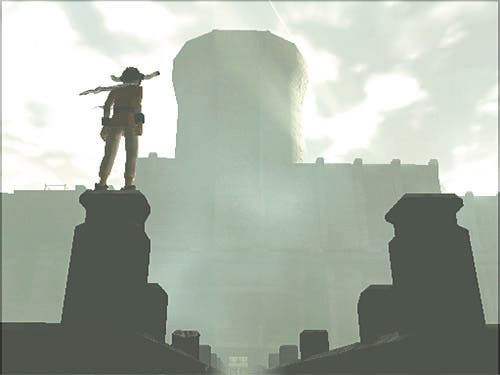
ICO is certainly not without fault. Fighting the castle's shadowy demons is as often a nuisance as it is frantic, although to its credit the game seldom attacks Yorda when you're right in the middle of something. There will be times when you run off a ledge without meaning to, or fall a distance you can't survive without realising, or suffer at the hands of some perspective problem. The camera, which positions itself as a chosen point in an area and lets you twist it from side to side to see more, can frustrate you and confuse angles. And puzzle solutions can, on very rare occasions, seem peculiar or even slightly obtuse.
But I'm reminded of something Kieron said in our end-of-2005 testament to the virtues of Psychonauts: he said that right now Psychonauts isn't his game of the year, but that if you asked him about it in twenty years time, it very well might be. Perhaps the most warming thing I can say about ICO is that for its faults it didn't need twenty years for me to forgive what upset me a few hours ago; it just needed for me to picture myself on the beach, so to speak. For that to be the case, and for me to enjoy ICO every bit as much as I did four years ago, it has to be worth owning.
I don't even want to stop typing. I don't want this to be the last time I'm writing about ICO. I want to keep going on about everything I love about it. I want to tell you how I've whistled the save screen music at least once a month for nearly half a decade; I want to talk about the noises Yorda makes when you're hitting call repeatedly and she can't do anything; the little moments of levity; I want to tell you about the mace I found; I want to tell you what you can do once you've completed it. I really don't want it to end.
I'm listening to the last song on the soundtrack now - the music that you hear over the final scenes and the credits. It's called "You were there".
This time, please do be.


